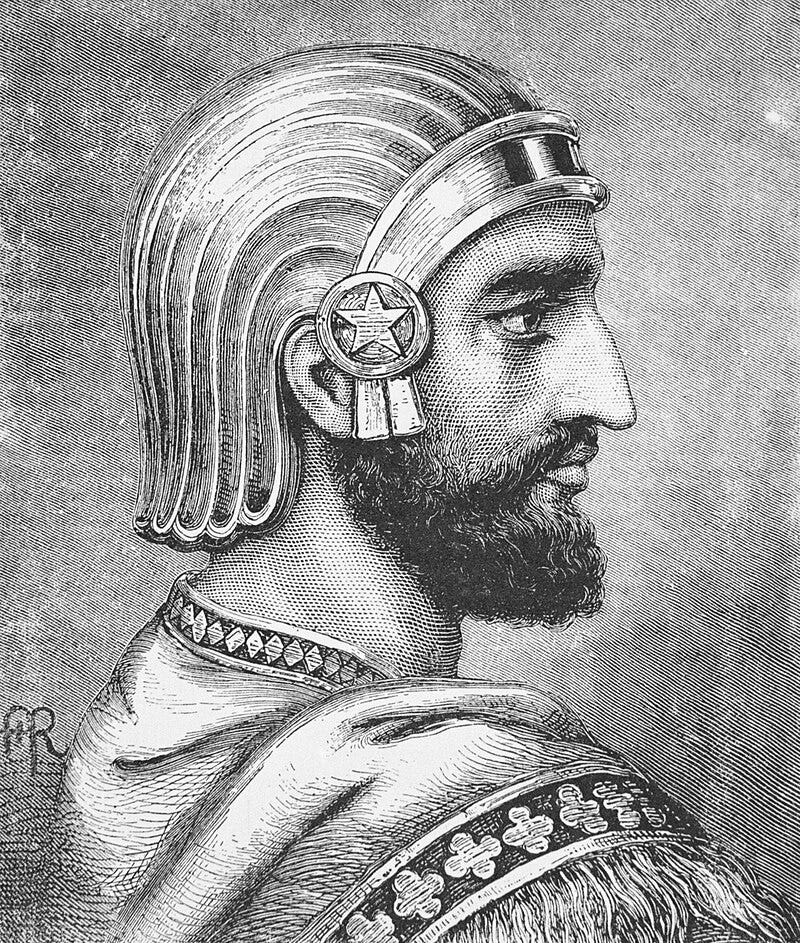This morning I decided to start reading the Book of Ezra with my children. They know the story of how Nebuchadnezzar of Babylon sacked Jerusalem and destroyed the Temple, so I thought they might appreciate hearing the story of its rebuilding. The book starts with the edict of Cyrus, King of Persia, allowing the Jews to return home to rebuild the Temple.
Cyrus is an interesting historical figure. When he took the throne in about 559 BC, Persia was a relatively minor kingdom in the ancient near east, surrounded by more powerful realms of the Medes, the Lydians, and the Babylonians. Over the course of 20 years, however, Cyrus conquered each of his neighbors in turn, incorporating them into what many consider the first great empire in world history.

Unlike the Babylonians and the Assyrians, who made a point of demolishing cities and shrines of the people they conquered, Cyrus respected the religions and traditions of his various domains. The text of the so-called Cyrus Cylinder, a clay artifact discovered in 1879, depicts Cyrus as being more loyal to the Babylonian god Marduk than the last Babylonian king Nabonidus. This was surely a way for Cyrus to establish his right to rule the Babylonian people beyond mere conquest.
This policy is most known to Jews and Christians through the Edict of Restoration, in which Cyrus allowed the Jews to return to Jerusalem and rebuild the Temple:
“Thus says Cyrus king of Persia: The Lord, the God of heaven, has given me all the kingdoms of the earth, and he has charged me to build him a house at Jerusalem, which is in Judah. Whoever is among you of all his people, may his God be with him, and let him go up to Jerusalem, which is in Judah, and rebuild the house of the Lord, the God of Israel—he is the God who is in Jerusalem. And let each survivor, in whatever place he sojourns, be assisted by the men of his place with silver and gold, with goods and with beasts, besides freewill offerings for the house of God that is in Jerusalem.”
Ezra 1:2-4 ESV
In the 45th chapter of Isaiah, either written before or after Cyrus’ reign, depending on who you ask, God called him anointed — the literal translation of messiah:
Thus says the LORD to his anointed, to Cyrus, whose right hand I have grasped, to subdue nations before him and to loose the belts of kings, to open doors before him that gates may not be closed:
“I will go before you and level the exalted places, I will break in pieces the doors of bronze and cut through the bars of iron, I will give you the treasures of darkness and the hoards in secret places, that you may know that it is I, the LORD, the God of Israel, who call you by your name.
Isaiah 45:1-3 ESV
Several figures in the Old Testament were called anointed, but Cyrus was the only one not to hail from the people of Israel.
Who knows whether Cyrus truly believed in Yahweh, the God of Israel, or if he simply curried favor with the Jewish people to earn their loyalty. Either way, he did good for the people of God. Even today, God often uses the people you might least expect to accomplish His will.
I wonder if any of the Jews in exile thought that the Persian conquest would be a good time to raise an armed rebellion and regain their homeland that way. Perhaps some did not trust this new pagan king and his conciliatory approach. Some Jewish communities clearly saw no reason to leave their new homes, since Esther and her people were still in Susa nearly a century after Cyrus. Nevertheless, God’s will was done.
I think one lesson of this story is to not write anyone off. We can have disagreements in the political realm, even sharp and passionate disagreements, but we should keep the lines of communication open. You never know what opportunities might arise. The same God who used a Zoroastrian king can surely use conservatives, moderates, progressives, or even you and me to do His will.
And we know that for those who love God all things work together for good, for those who are called according to his purpose.
Romans 8:28 ESV
About Brian Almon
Brian Almon is the Editor of the Gem State Chronicle. He also serves as Chairman of the District 14 Republican Party and is a trustee of the Eagle Public Library Board. He lives with his wife and five children in Eagle.













Thanks, Brian! This was a timely message for me! Jane